The 'At Home' archive
Come in...and please make yourself at home!
In this collection, our readers celebrate the joys and challenges of staying in. They explore what it really means to ‘feel at home’, both literally and metaphorically, and finding home in unexpected places.
What does ‘being at home’ mean for you?
If you have a moment, we encourage you to take some time out and explore our mini archive of home-made features from previous issues.
So…put on your finest pair of pyjamas, grab a cup of tea, and enjoy our readers’ odes to their humble abodes.
Scroll down to read them all.
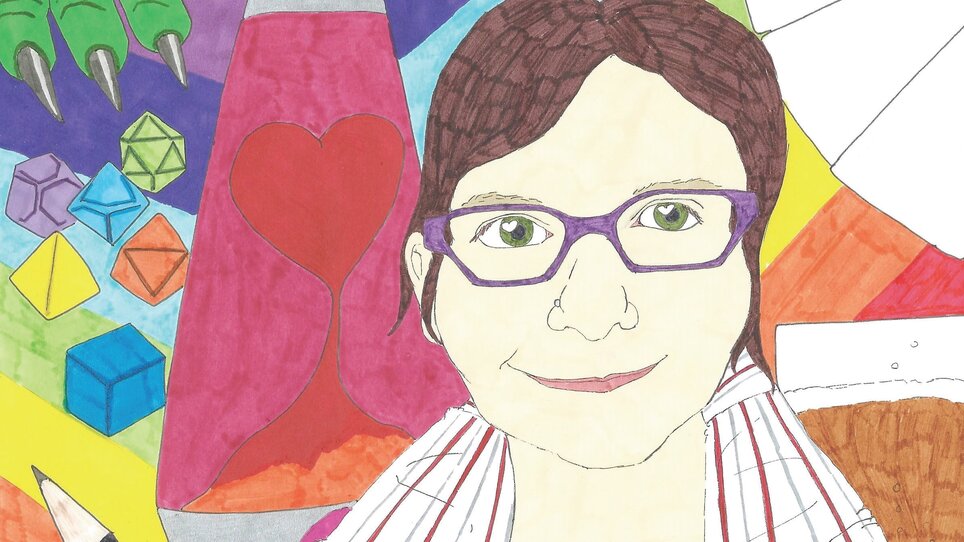
At Home articles
-
My fridge definitely talks to me. I know this because the fridge manufacturer sent a fridge language book with her. So you know when she says, “Mmmmmmmmm,” it’s time to shut the door and if she burbles, “Bububububub,” that means she is working on cooling things down a tad.
Anyway, when she first came, I did try and learn her lingo. We did some bonding sessions but it was all a bit one-sided. There was no real communication. Plus there was an element of hypochondria on my side. If the fridge started murmuring words which were not in her book (off page) I went into a frenzy of fridge worry.
The first time this happened was around 4am the first night she was with me. I woke up to hear a high pitched “Eeeeeeeeeeee” coming from the kitchen. I jammed on my Crocs and stumbled into the kitchen.
The fridge was making a terrible screaming noise. I opened her door and she stopped.Abruptly, immediately, instantly. All of those. I stared at her in disbelief. I pulled the book of words out of the kitchen drawer and flipped through it anxiously. Lots of mmmmmms and bububububububs but no mention of a scream. No eeeeeeeeeee. The book was silent.
I peered inside. Not enough milk, just enough yogurt and too much alcohol. The fridge burped.
“Pardon you,” I said firmly. The fridge had to learn the house rules. I was the boss around here.
I shut her door and stared at the steel-coloured face of the fridge.
“I’ll see you in the morning. Proper morning. Okay?”
The fridge stared silently back at me. I snapped off the light switch and headed for my bedroom.
“Eeeeeeeeeeeeee!”
The fridge was screaming again. It was then that I realised the truth. The fridge was afraid of the dark! I switched the light back on
again and padded over to the fridge and yanked open her door. The screaming stopped almost immediately.I crossed my arms over my chest.
“Look, I am not leaving the light on, right? It’s too expensive and I like it dark and I can see the light under my bedroom door because this is a poxy rabbit hutch of a flat. Right? So pipe down.”
The fridge gave a little shudder. I shut her door carefully and crept back to the light switch and turned it off cautiously. Silence. Nothing. I tiptoed back to bed like a hopeful van Winkle and dived under the duvet.
The peace lasted less than five minutes. I was just dozing off when the fridge started screaming again.
“Eeeeeeeeeeeeee!”
I rammed my head under the pillows but nothing could stop the high-pitched noise reaching my ears. I stormed into the kitchen and pulled the fridge’s door open. Instantly the noise stopped.
“Look,” I said, angrily, “This has to stop. Now. If you start that noise again I’ll call the engineer. Got that?”
I swear the fridge giggled. I looked round for the handbook.
“You don’t believe me, do you,” I snarled. I found the call-out number and strode confidently over to the landline. I dialled the helpline. The fridge whimpered.
The phone clicked and whirred. An electronic voice purred in my ear.
“Sorry, we are closed right now. Please ring back between 9am and . . ..”
I slammed the phone down. The fridge shuffled and burped. Triumphantly.
“Shut up!” I shouted. “This is your last chance!”
I shut her door firmly and stamped back into my bedroom. I pulled the duvet round my ears, bracing myself for the next screaming fit.
I didn’t have long to wait.“Eeeee . . .!”
I rushed into the kitchen and pulled out the fridge's plug.
The silence was almost tangible. I breathed out slowly and stumbled back to bed. I felt like I’d killed someone but even fridge death was better than the interminable screaming.
In the morning the fridge was a silent replica of her former self. I opened her door. No light came on. I hadn’t put anything in her freezer drawers apart from one packet of frozen peas so there wasn’t much to lose.
I crunched my cornflakes, keeping an eye on the fridge. The milk was still cool, but not as icy as I liked. I wasn’t looking forward to warm yoghurt or tepid white wine if the screaming fits carried on.
“I’m calling the fridge doctor the moment they open,” I told the fridge. “This has got to stop.”
She stared balefully back at me.
As soon as the clock said 9am I hit the fridge helpline. Option 3 answered pertly. I struggled for words.
“It’s about my fridgefreezer. She’s afraid of the dark. She won’t stop screaming and it’s not in the book.”
Option 3 soon put me right. She asked me how full the freezer bit was. Fridge-freezers need their drawers to be kept full of frozen food. If I had looked in the troubleshooting section it would have explained that my fridge would emit a high pitched alarm if she was
too empty. The alarm stopped if you opened the door. It wasn’t about the dark.I put the phone down and went over to the fridge. I clenched my firsts and held them down by my sides.
“Sorry, my fault.”
I plugged her in and she made a low whirring noise.
I patted her door sympathetically and went out to buy a shed load of frozen vegetables. I staggered back up the stairs with them and
stashed the freezer bit of the fridge full with frozen veg. The fridge chuntered happily.“Burrrrrrrrr.”
After that we never looked back. The fridge settled in happily and I kept her well stocked.
She slept through the night and so did I.
I decided she needed a name. Freda. Freda the fridge. A nice bit of alliteration. Not that she is a person or human.
 Don’t get me wrong. I’m the only human in my flat.
Don’t get me wrong. I’m the only human in my flat.Tonight we’re watching Frozen, the movie. With ice cold white wine.
-
You can read Runaway horses (part one) in issue 90 of the Spectrum.
I kept driving myself on to find out more despite people telling me to slow down, give myself time to digest, but they didn’t understand I was on a life-and-death mission. A mission to understand and make sense of me. I couldn’t live in a no man’s land of not knowing if I had this thing.
I had to know. What began by trying to prove everyone wrong quickly turned into a desperate search to understand what made me tick.
I started to see how the triad of impairments the clinician had mentioned related to me, especially around communication with other people. I had flashbacks of parts of my life which made no sense at the time but looking back at them through an Aspergic filter, they became clearer.
It started to make sense to me why so many of my relationships had failed. Why I had struggled to make friends and maintain those relationships. I could never quite “get” how relationships and friendships were supposed to work. I had tried to copy what I saw other people doing with ease, yet, when I tried to emulate them, I could never get it quite right. I was always slightly off the mark and would invariably end up annoying or upsetting someone. I was constantly confused and bewildered by people and social interactions.
No one gave me a manual, how to do this “people” thing, and I had blundered through life distancing people from me because I would so often come across as demanding or aloof or abrupt, when all I wanted was to make friends and be part of the group. So I learned not to talk to people unless I had to. It was safer that way. Hurt less. I read on an email signature recently from an Aspergic lady, “Just because I don’t talk to you, doesn’t mean I don’t want to.” I can relate to that.
The research I was doing continued to pile on the evidence of how other people who had Asperger’s had experienced similar difficulties. They too were always looking in on the world from the outside. They too never quite fitted in. They too were never part of the in-crowd.
Occasionally I could pretend to be 'one of the gals' but it exhausted me and I would need to come home to peace and quiet and recharge my batteries. Socialising, even just talking to people at work, was exhausting and it had got more exhausting the older I was getting.
Some time ago, I’m not sure when, I had decided I was safer on my own. I could shut the world out and find peace in my garden. Life was too much hard work, too bewildering and upsetting. I was only going to talk to someone if I had to, which usually meant going to work four days a week to earn enough to keep a roof over my head. Any extra socialising was only carried out on rare days when I felt able to cope with the demands it placed on me. This could be as little as once every six months and that was fine with me.
I knew my life was small and getting smaller but I found peace and tranquility in my wildlife garden. Here I could let my hair down, be me, no pressure, no one demanding anything of me.
As my anxieties raced out of control on an almost daily basis, I started to notice the coping strategies I could put into place to help alleviate them. Being in my garden was and still is, a coping strategy. I find the brain a marvelous organ which can respond to external stimuli in the blink of an eye — just smelling a rose brings me down to earth.
I have sensory over-sensitivity and this means my sense of smell is heightened, so too is sensitivity to light and noise but the smell thing can be a benefit. Smelling the roses for me is more than just a sensual experience. The aroma reaches deep into my soul and causes child-like giggles. My lungs feel soothed, my skin feels stroked, my feet feel light and I feel at one with nature. I become a rose. A lilac bush can have a similar affect. A skimmia bush is in full flower in my front garden at the moment and it’s honey-l
 ike pollen calls me daily to indulge my senses and when I sniff it gently, I drift away to some peaceful part of heaven that only I have access to.
ike pollen calls me daily to indulge my senses and when I sniff it gently, I drift away to some peaceful part of heaven that only I have access to.Someone without ASD and sensory sensitivities doesn’t have access to my little piece of heaven. I am grateful this part of heaven has my name on it.
-
The chocolate digestives lived peacefully on the shelf in Tesco’s until one afternoon they were taken. Once they were brought home to Mrs Speed’s house she undid them and put them in her biscuit box. The chocolate biscuits felt very intimidated, as some of the other biscuits who were there were quite resentful of these new additions to the biscuit box. There were plain digestives, ginger nuts, Bourbons, custard creams and Jaffa cakes.
The custard creams and digestives looked down their noses at the Jaffa cakes and Bourbons. This was because those biscuits with a hint of chocolate were always eaten first by the humans, whereas the other biscuits were left to go stale and that was a really unpleasant death. The ginger nuts were fiery, and were always bossing the other biscuits about. They would always jump the queue every time the biscuit box was opened because they wanted to be eaten first. But little did they know that these new chocolate digestives wouldn’t be bullied by the ginger nuts, like the other biscuits were.
Every time the ginger nuts pushed the Jaffa cakes around when the biscuit box was opened, the chocolate digestives would jump about as high as they could so they’d find themselves being picked by the humans first. The plain digestives and custard creams started to feel guilty seeing how the ginger nuts behaved towards the other biscuits. So the next time the biscuit box was opened when the ginger nuts were pushing the Jaffa cakes and Bourbons about, the digestives lifted the Jaffa cakes and Bourbons up to the top of the box so that the humans could eat them. After the chocolate digestives, the Jaffa cakes and the Bourbons had been eaten, the ginger nuts came to realize that they couldn’t boss around any new additions to the biscuit box anymore. The plain digestives and the custard creams wouldn’t tolerate it.
Sadly, though, this was forgotten, as one afternoon Mrs Speed took her grandson Martin to the bakery to buy him a treat. He was spending the afternoon with her helping her sort through some old photographs. Martin licked his lips as he looked at all the cakes and pastries, “what shall I have” he thought to himself.
“Do you want a gingerbread man?” asked his grandma; “Go on then gran,” replied Martin. So the lady behind the counter having heard his request got her prongers, and put one gingerbread man in a paper bag and handed them to Mrs Speed. “That’ll be £2.30 please” said the lady; “Here you go keep the change,” said Mrs Speed handing in £2.50.
Once Mrs Speed and Martin got home they removed the gingerbread man out of the wrapper, and put him in the biscuit box for Martin to have after his lunch. All the biscuits stared at this new and strange arrival, as half of the gingerbread man’s leg had been eaten. Martin had sneakily taken a bite of it when his gran wasn’t looking. “What are you?” asked the custard creams; “I’m a gingerbread man,” he stammered in fear.
He didn’t like being stared at one bit, and it made him feel intimidated. The ginger nuts recoiled in horror at him, the Jaffa cakes and Bourbons laughed at him because his leg was missing and he had to hop around. The plain digestives were the only ones who didn’t laugh; they were very angry with the other biscuits. What they were doing was bullying the poor gingerbread, they should have known better as some of those biscuits had been bullied themselves.
The plain digestives decided to speak to the chocolate digestives about this bullying, as it had to be stopped. If the poor gingerbread man didn’t get eaten soon, he may go stale even more quickly than usual with being so unhappy at being picked on.
Later on the biscuit tin was opened again and a few chocolate fingers were dropped in: the attention was now on the fingers. And the gingerbread man was left alone for a while. The chocolate fingers were very jolly and always seemed to be laughing — some liked to dance about and throw themselves up and down. But there were two amongst them that were very different to the others, they were always on their own and ignored. When the plain digestives asked why they were on their own, all the other chocolate fingers would say was, “One’s odd, and the other is slow:, they aren’t one of us”. The poor chocolate finger that was referred to as odd just stood in the corner in his own world. And when the other biscuits tried to approach him to introduce themselves he would cower away in fear.
The other chocolate finger who spoke slowly chatted away happily, but the biscuits would laugh at the way he spoke. This made the poor finger burst into tears and walk away, to be with the other finger. “We’ve got to do something about this, it’s wrong,” the plain digestives said to the chocolate digestives. “Just because somebody is different doesn’t mean its right to be cruel to them; the Jaffa cakes and the custard creams should know better. They were pushed about by the ginger nuts,” said a plain digestive.
So it was decided that a meeting be held with all the biscuits together, to talk this through. Meanwhile one of the chocolate digestives would go and sit with the two fingers to try and befriend them. By this point the gingerbread man had joined them, as he too was made to feel isolated. At the meeting the Jaffa cakes, custard creams, chocolate fingers and ginger nuts bowed their heads in shame, as the plain and chocolate digestives told them exactly how they felt about the cruelty towards the gingerbread man and the two chocolate fingers. “Imagine how you would feel if people laughed at you, because you looked different or you were slow to understand what was said to you.” “We are very sorry,” said the biscuits together.” “We would like you to start being nice straightaway,” said the chocolate and plain digestives. “Especially to the gingerbread man as I suspect he’ll be eaten soon.”
All the biscuits together walked towards the two chocolate fingers and gingerbread man, and all said, “We are very sorry we were unkind to you and left you out.” They held out their hands and said, “Can we shake hands and be friends?” The gingerbread man and the two chocolate fingers warily held their hands out to shake the other biscuits’ hands, and with that the chocolate and plain digestives went, “Hurray!” and gave them a round of applause.
Later that afternoon the biscuits all mixed together freely, happily chatting away. The gingerbread man felt accepted by the
 other biscuits, as did the two chocolate fingers. The biscuits were very patient with the chocolate finger who spoke slowly, and they let the chocolate finger who found it difficult to communicate to only talk when he felt comfortable to. And by the time Martin put his hands into the biscuit tin to collect his gingerbread man, all the biscuits were content and happy. Several custards creams and ginger nuts were also taken to go with Mrs Speed’s cup of tea. But the important thing was that all the biscuits that were left in the tin treated each other with respect and kindness: that was how it should be.
other biscuits, as did the two chocolate fingers. The biscuits were very patient with the chocolate finger who spoke slowly, and they let the chocolate finger who found it difficult to communicate to only talk when he felt comfortable to. And by the time Martin put his hands into the biscuit tin to collect his gingerbread man, all the biscuits were content and happy. Several custards creams and ginger nuts were also taken to go with Mrs Speed’s cup of tea. But the important thing was that all the biscuits that were left in the tin treated each other with respect and kindness: that was how it should be.
-
It started as far back as I could remember. As a child I would often go off to play on my own. Why? I do not know, but as a child I was always on my own, doing the silly things I could get away with. But after I was punished, I would go into my bubble. I suppose I would go in there because I was bullied so much at school - even by my teachers who just assumed I wasn't listening, when the truth was I was trying my best to remember what they said. I would often get into trouble for doing things that I didn't think were wrong.
The bubble is a place where I can go to be on my own. A place of peace, and a place where nobody can get me. Nobody else can get in. I will only come out when I think it is safe to do so. In January 2005 I was diagnosed with Asperger syndrome and am still coming to terms with being autistic, but life has to go on.
So, what is this bubble? It is an imaginary place in my mind - space around me where nobody can come near me. In fact I am best left alone when I am in my bubble. Sometimes I am in there for a day or more, or just a couple of hours, but I always come out refreshed and ready to tackle anything that comes my way.
It sounds crazy, but everybody needs somewhere to go to be alone sometimes, to get away from life's daily turmoils and problems, and most of the time I cannot cope with everyday problems, so what do I do? I go into my bubble, not realising that my poor wife is then left clearing up the trail of destruction that I have caused, and has to try and sort things out again!
My bubble is a clear bubble, and although no-one else can come in, I can see out, and am still aware of what is going on around me, even though I might not take much notice. Nobody else can see my bubble, and nobody is even aware that it is there, but I feel better because I feel safe. I don't think anyone else would understand about my bubble anyway, so I keep it to myself. I don't even tell my wife when I go into my bubble, but I realise now that I should tell so that she might be able to understand me better.
I am writing this letter to Asperger United (now called the Spectrum) to let other people know that it is ok to have a place to go when you need to, but you should always share this with someone (a carer/partner/parent...) so that they will know you need this space, and will back off when you need them to.
I have been fortunate enough to be part of a couples’ group for a year now, along with my wife, where we go on a weekly basis, and meet with some other couples where the men are autistic, and the women are not. It is overseen by our clinical psychologist
 and the autism coordinator of the centre. This has been a tremendous support for us, and we get the opportunity to share with each other what problems we have faced that week, and know we are not alone. In fact, we have been using a new communications system, devised by one of the wives in our group, which has also been of great assistance to us and our relationship, and has led me to sharing with my wife and the others about my bubble.
and the autism coordinator of the centre. This has been a tremendous support for us, and we get the opportunity to share with each other what problems we have faced that week, and know we are not alone. In fact, we have been using a new communications system, devised by one of the wives in our group, which has also been of great assistance to us and our relationship, and has led me to sharing with my wife and the others about my bubble.
"My fridge definitely talks to me. I know because the fridge manufacturer sent a fridge language book with her."
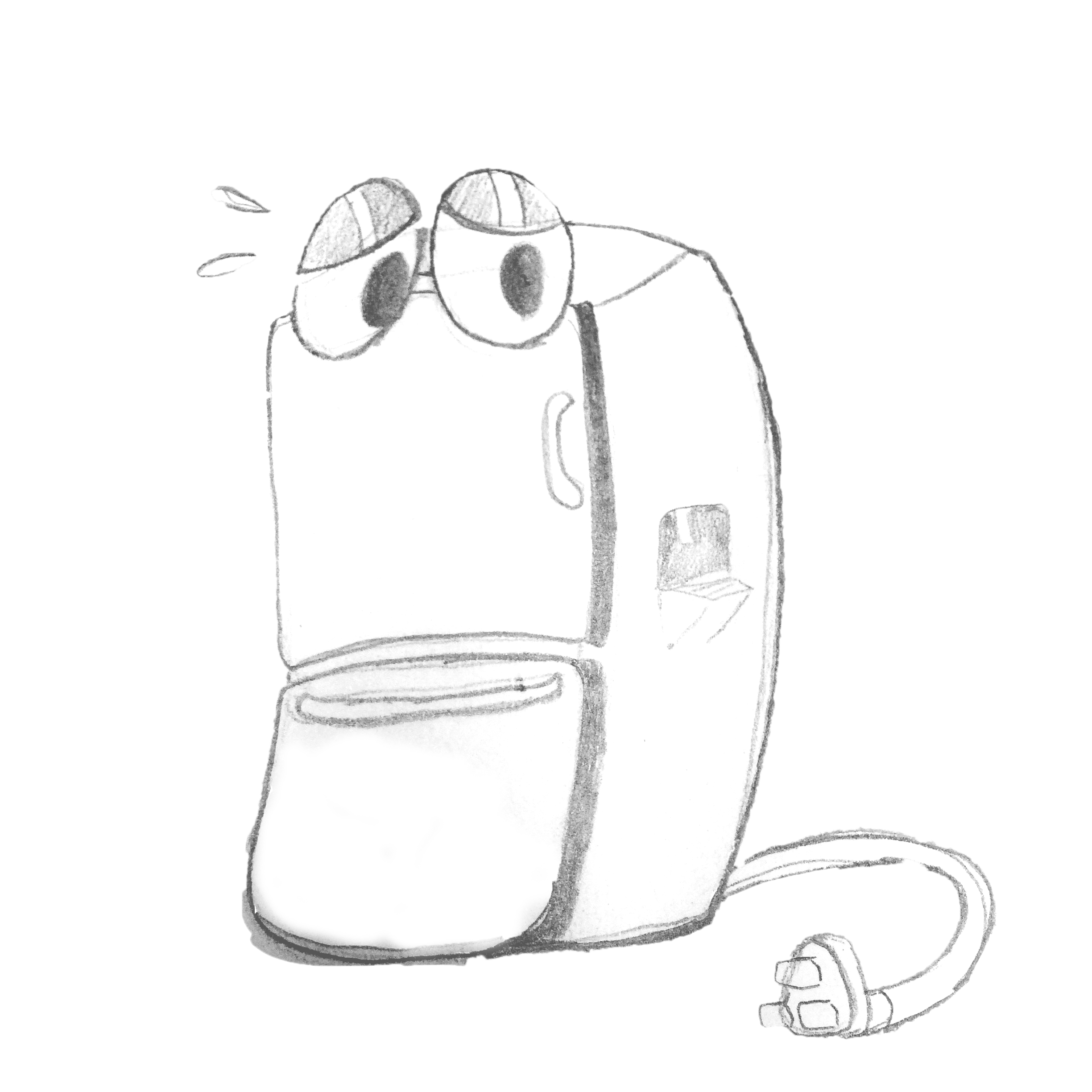
Our in-house art gallery
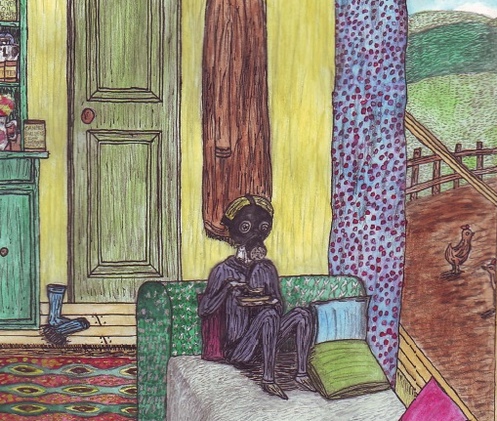
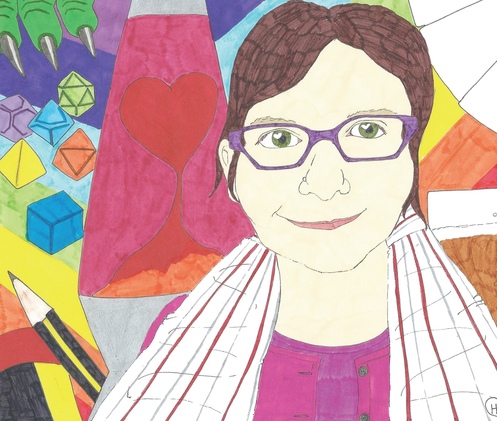
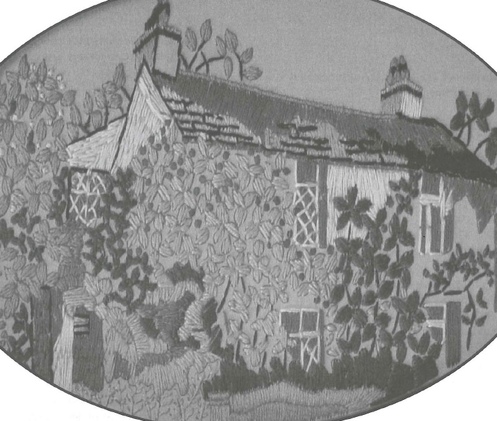
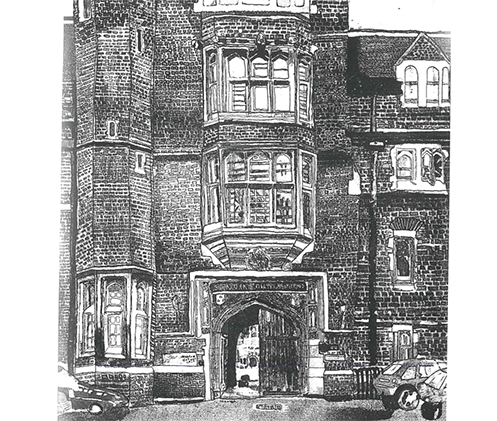
'Selwyn College' by Tom
the Spectrum issue 10, April 1996
Calling all contributors!
We want to share the amazing archive of autistic prose, poetry and art that is the Spectrum magazine. If anyone who contributed to the magazine doesn’t want their work to be reproduced, please email us at content@nas.org.uk and we will remove it.

Subscribe to the paper magazine
A subscription will pay for four issues of the Spectrum magazine, delivered straight to your door. Visit our online shop to order your subscription today.

Submit work and our rules
Whether you have an article, piece of artwork or a poem you would like to be considered for inclusion, please send it in and it could appear in a subsequent issue.
Find out more